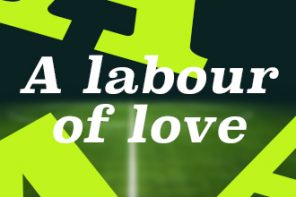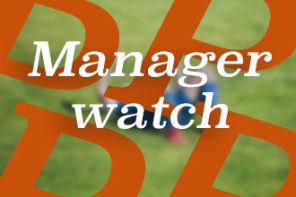Despite their careers having a significant overlap, the Premier League’s top two scorers never played together for England. By the time a sprightly 17-year-old Wayne Rooney was unleashed in a friendly against Australia in 2003, Alan Shearer had been retired from international duty for three years. Shearer would play on for another four seasons, scoring another 86 goals, but the passing of the baton from one great England centre-forward to another never happened.
It very nearly happened at club level, though. It now seems like a distant and faintly surreal past, but back in the summer of 2004, when Rooney had just taken the European Championship by storm and was the hottest properly on the continent, two clubs were battling it out for his signature. One was Manchester United; the other was Newcastle.
Still nursing the cracked metatarsal that brought his tournament to an early end, Rooney had told Everton he wanted to leave once interest from elsewhere became concrete. The frontrunner for his signature was not who you’d expect.
“Newcastle emerged as serious candidates to win the battle for Wayne Rooney last night after Everton rejected Manchester United’s offer of £20m for the striker’s services,” reported The Independent on 26 August, adding that David Moyes already knew how he was going to spend the cash and had submitted an early bid for Liverpool’s Djimi Traore. Robbie Savage and James Beattie were next on the list.
That the son of Newcastle chairman Freddie Shepherd worked for Rooney’s agent, Paul Stretford, was thought to be leverage that could take the teenager to Tyneside – but not the only leverage. As The Independent continued: “Newcastle may have a trump card in Alan Shearer, whom Rooney grew up idolising. Rooney has said that Shearer would be his ideal strike partner.”
In the end, neither Shearer nor Shepherd could get the deal done. Newcastle upped their bid to £23.5m; United duly raised theirs to £25.6m, and precisely one month later Rooney was marking his first game at Old Trafford with a remarkable hat-trick.
As for Newcastle? They needn’t have worried too much – after all, their squad was already overflowing with precocious homegrown talent. James Milner was 18, Jermaine Jenas 21, Kieron Dyer and Craig Bellamy 25, Titus Bramble just 23. In Bobby Robson they already had the perfect father-figure manager to oversee the project. And besides, it wasn’t as if their summer hadn’t already included the signing of a glitzy, high-pedigree centre-forward. All they had to do was sit back and wait for Patrick Kluivert to start banging in the goals.
Football being football, things didn’t work out quite so smoothly. A winless start to the season saw Robson dismissed after four games, a 4-2 humbling at the hands of a Carlton Cole-inspired Aston Villa his final match in charge. (Paying no heed to the fate of his predecessor, Ruud Gullit, Robson left Shearer on the bench for the defeat that sealed his fate.)
Thus followed – to use a phrase much repeated in the years since – a tortuous season on Tyneside. With rumours of discord rife among the dressing room’s ensemble cast of volatile characters, the situation demanded tact, patience and a cool head. In came Graeme Souness. His first diplomatic intervention was to ship Bellamy off on loan to Celtic, where he scored nine in 15, won the Scottish Cup and sent gloating text messages to Shearer after Newcastle were eliminated from the FA Cup. Shearer replied saying he’d “knock Bellamy’s block off” if he ever set foot in the city again.
Kluivert, meanwhile, couldn’t hit a barn door – his most notable exploit was losing a £4,000 diamond earring during training – and at the other end, a centre-back pairing of Bramble and Andy O’Brien was doing little to keep opponents out. In January Souness sought to remedy matters by splashing out a staggering £8m on Jean-Alain Boumsong, a player Rangers had signed for free six months earlier. “The supporters will enjoy watching him play,” Souness assured. The supporters did not enjoy watching him play. Newcastle’s slump continued.
With the campaign approaching its end, Souness blamed the club’s training ground for the number of injured players in his squad, and when Aston Villa came to visit in April dignity at St James’ Park reached an all-time low. First, with the hosts trailing 1-0, Steven Taylor was sent off for handling the ball on the line, an act whose hastily attempted cover-up saw it pass into internet folklore.
Nine minutes later, Lee Bowyer and Dyer, the former complaining that the latter wasn’t passing to him, went for each other, had to be wrenched apart by peacemaking opposition players, and were both sent off. (The various responses to the incident were telling: Taylor was delighted that his own ignominy had been overshadowed; Boumsong sprinted into the dressing room in the hope of the scrap reigniting; Shearer branded the pair a disgrace to the club; and Souness challenged them both to fight him.) The most sheepish public apology in football history quickly followed.
By the end of the season, a club that just 12 months ago looked starry-eyed and upwardly mobile had sunk to 14th. Rooney, meanwhile, finished the campaign as Manchester United’s top scorer and was named PFA Young Player of the Year.
Newcastle responded to a calamitous season in the rashest way possible: with a summer firesale/shopping spree extravaganza. Out went Bellamy, Jenas and Milner; in came Albert Luque, Emre Belozoglu and – having failed to get their English golden boy a year earlier – Michael Owen. Each proved disastrous in his own way and though Newcastle clambered to seventh the following season, the Premier League’s “big four” were by then sealed away at the top of the table, the virtuous cycle of Champions League money keeping them in place. Newcastle had missed the boat.
Shepherd quickly saw that his money wasn’t sufficient to break through the glass ceiling and, a year later, sold up. “The board believes that a critical factor in improving the performance of the club on the pitch is Newcastle’s ability to invest in its squad,” he said. “Mike Ashley will be [an] excellent custodian of Newcastle United’s heritage and will provide the best possible opportunity for the club to flourish in the future.”
Could all that have been different had Rooney chosen the northeast over the northwest back in summer 2004? It’s certainly hard to imagine the arrival of the planet’s most bullishly brilliant young player failing to galvanise a squad already rich in attacking exuberance. That season was also the last before the drawbridge between the top four and the rest was pulled up: Everton finished in the prized final Champions League spot, but failed to make it past the qualifying stage. Liverpool (level on points with Bolton) finished fifth and qualified by dint of winning it. For the next half-decade, the same four clubs monopolised the European spots and a hierarchy was concretised, its influence still clear today.
But in 2005 fourth place was up for grabs, and a Rooney-fronted Newcastle side would only have needed to finish ahead of his former club (duly spearheaded by Beattie – though not, alas, bolstered by Traore) to reshape not just the club’s modern era, but the Premier League’s too. Everton did well that season, but they were the best of a middling bunch, the default winners of a slow bicycle race. With Rooney and Shearer up front, and Robson in the dugout, the Magpies would almost certainly have raced ahead.
But it wasn’t to be. You imagine Rooney will have few regrets, though Newcastle may have a few. And to rub salt in the wound, it was a saga entirely of their own making. On the day of Rooney’s unveiling, on 1 September 2004, Alex Ferguson said: “It’s a strange twist of fate that if Newcastle hadn’t come in for him he wouldn’t be here, he’d probably still be at Everton. Once we knew Everton were talking to another club we had to do something. We didn’t think he was available.”






